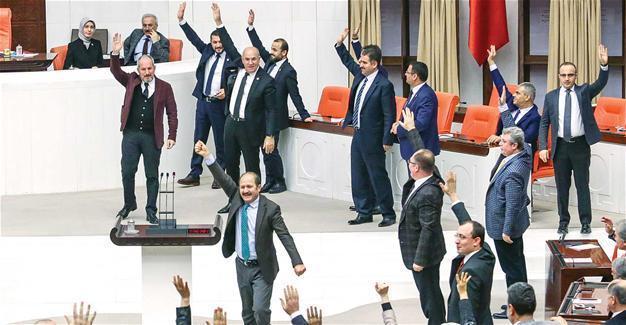Turkey heads on referendum for a constitution change
ANKARA

Parliament approved the constitutional amendment package that brings drastic changes to Turkey’s political system with 339 votes early on Jan. 21, exceeding the 330-vote threshold to bring the charter to a referendum.
The 18-article package, which shifts governance from the current parliamentary system to an executive presidential system, will be put to referendum on either April 2 or 9, a date to be selected by the Supreme Election Board (YSK) after President Recep Tayyip Erdoğan approves constitutional amendments.
“Now I hope the nation will make a real decision,” Erdoğan said on Jan. 21 following parliament’s vote.
“I believe that you will walk to the future by working day and night in this campaign for the referendum,” he added, speaking at the official “opening ceremony” of a new metro line in Istanbul’s Pendik district.
AKP to start campaigning on Feb 7After the voting, Prime Minister Binali Yıldırım convened the ruling Justice and Development Party (AKP) group in parliament at 4:00 a.m. to congratulate them.
“The people will have the final say. We have done our job. Now we convey the issue to its real owner, our people,” Yıldırım said.
He also stated that the AKP is planning to start the referendum campaign on Feb. 7.
“I want to see a party group that cannot wait to go energetically into the field on Feb. 7,” Yıldırım said.
Nationalist Movement Party (MHP) leader Devlet Bahçeli also commented on the decision just after the historic vote, which his party supported, saying “the Turkish nation will do its own evaluation and hopefully it will add to what have been achieved so far.”
Controversial items approved
The constitutional amendment brings a strong partisan presidential system that will take over all authorities of the prime minister and cabinet and also will have the authority to issue decrees in effect of law, to appoint vice presidents and cabinets who can be outside of the parliament and not elected, and to hold the title “head of the state.” For the first time since the use of this term for Kenan Evren, Turkey’s former coup leader and seventh president, with the provisional article of the 1982 Constitution, the title “head of the state” enters the constitution as an article.
The president will be given the authority to annul parliament and declare an election, while they will also have the authority to declare a state of emergency, during which they will have the authority to issue decrees without any restriction of jurisdiction.
The duties and authorities of the parliament are amended in the amendments, with its authority to supervise ministerial cabinet and ministers, as well as its authority to assign cabinet to issue decrees in effect of law, being abolished. Lawmakers will only be able to supervise ministers and the government with written statements, since the motion of interpellation will also be abolished.
The configuration of the Supreme Board of Judges and Prosecutors (HSYK) is similarly altered, with its number of members reduced from 22 to 13. Out of 13 members, four will be appointed by the president, while the justice minister - who will be appointed by the president - will be the chair of the board and the undersecretary will be a permanent member. The seven remaining members will be elected by the parliamentary majority, which will likely to be the political party of the president.
The charter will be submitted to Erdoğan for presidential approval, followed by a referendum likely in early April.
Proposed changes to the constitution require a simple majority in the referendum and the public will vote on the entire charter in one “yes/no” vote.
 Parliament approved the constitutional amendment package that brings drastic changes to Turkey’s political system with 339 votes early on Jan. 21, exceeding the 330-vote threshold to bring the charter to a referendum.
Parliament approved the constitutional amendment package that brings drastic changes to Turkey’s political system with 339 votes early on Jan. 21, exceeding the 330-vote threshold to bring the charter to a referendum.